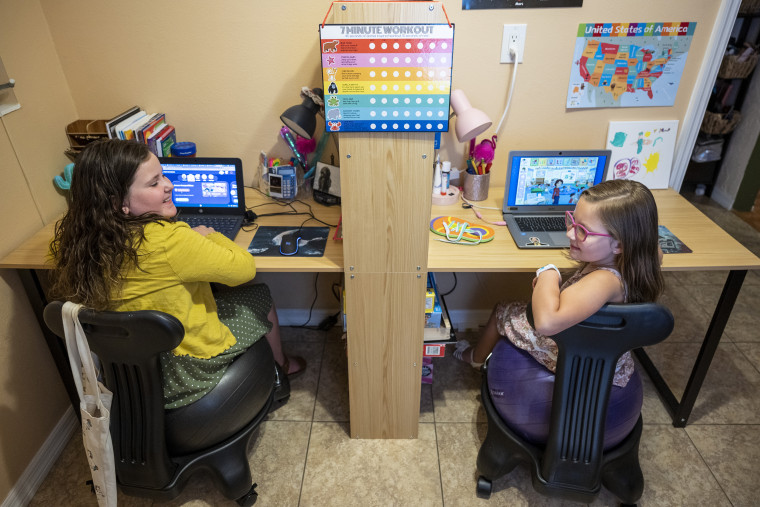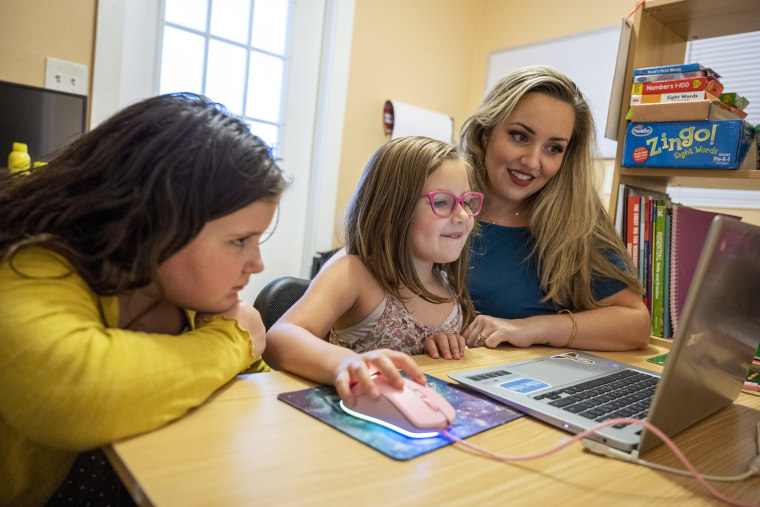During the pandemic, Jasmine Thorn found herself struggling with the online instruction offered by her kids’ schools.
Thorn, like many parents, tried to be a teacher to her own kids — two girls, aged 6 and 10 — but found herself “locking horns,” especially with her youngest, Jocelyn. Jocelyn had joined other students on Zoom to learn elementary school-age subjects, like reading, writing and basic math skills, but her mother found that the school-assigned online classrooms were unsuitable for both daughters.
In search of help, Thorn turned to Outschool, one of the most popular live online tutoring platforms in America. Thorn and her husband have since spent thousands of dollars on courses ranging from “Beginner French” to “Small Group Tutoring for Beginning Readers.”
The Outschool classes, she found, not only offered smaller and more engaging virtual classes, but are also in nontraditional subjects that her girls could engage with.
“[Jocelyn was] kind of isolated and we kind of started doing an hourlong kindergarten class, the basics” on Outschool, she said. “But it was social and made her feel less isolated and she could make some friends.”

Thanks to parents like Thorn, the online tutoring market is booming. The industry as a whole was worth over $5.6 billion in 2020, according to one study by Grand View Research. In 2018, it was a $4.2 billion industry, a rise of 33 percent.
Outschool is among the biggest tutoring platforms and has reportedly reached “unicorn” status — Silicon Valley’s nickname for a company worth more than $1 billion. Some of the other big players include Varsity Tutors, Tutor.com, Chegg, Paper, and many others.
According to CB Insights, a Silicon Valley venture capital analysis firm, investment in online education-related startups nearly tripled from 2019 to 2020, going from $4.8 billion to $12.6 billion.
Online tutoring companies have been boosted by a pandemic in which parents — and now also schools — are looking for ways to help children fill in the gaps left by an education system that is still grappling with its own remote-learning shortcomings.
But it’s also a dynamic that could bring a far more business-savvy and profit conscious model to what was once a localized and often personal part of the education world. It’s a shift that has some education experts questioning just how effective online tutoring can be.
“The type of tutoring with evidence is intensive tutoring with a consistent tutor who comes with an understanding of the students needs — based on data from direct assessments or from the school or teacher — and with curricular materials for addressing these needs,” Susanna Loeb, the director of the Annenberg Institute for School Reform at Brown University, said in an email.
“This type of tutoring is relationship-based in which the student and tutor come to know each other well and the tutoring builds student engagement and broader well-being as well as content-specific skills and knowledge.”
Many remote tutoring companies have started in the past 10 years and most follow a similar platform of connecting families with tutors who can help children with everything from math to reading and more.

Outschool offers a slew of classes that range from pure enrichment and entertainment, like “Mario Golf Super Rush Summer Fun,” to more practical classes in topics like cooking or American Sign Language for beginners. Teachers set their own Zoom-based classes and their own prices, usually from $1 to $25 per student for a 30- to 60-minute class. Outschool takes a 30 percent commission of whatever teachers take home, before taxes.
Allison Talbot, 33, of Montgomery County, Pennsylvania, has a full-time job as a school psychologist. But she has embraced Outschool as a way to make extra money on the side teaching art.
“I just really enjoy being able to do my most favorite hobby, which is art, and which is my passion,” she said. “It’s a little bit different than the school psychologist role, and a lot of the time it doesn’t feel like teaching. It’s so great working with the kids.”
Dabney Lawless, a spokesperson for Outschool, said in an email that the company is riding high and does not expect that to change as schools reopen despite the lingering pandemic.
“We are still growing and are still aggressively hiring,” she wrote.
Offering tutoring services directly to families remains the norm, but some companies are exploring other options. Paper, a Montreal-based company, provides a text chat-based tutoring service, staffed by employees who are paid hourly, rather than contracted tutors.
In turn, Phil Cutler, Paper’s CEO, said that this makes tutoring more affordable across the board.
In addition to its student-focused business, Paper has partnered with school districts from Fresno, California to American Falls, Idaho, going from 16 U.S. school district-based customers to 130, and jumping from 100 to 1,500 tutors during the pandemic. It charges $50 to $100 per student per year, depending on the size of the school district.
“The last two weeks has been the busiest two weeks we’ve ever had, and I don’t anticipate it slowing down,” Cutler said.
“The idea of equitably supporting your students is no longer a nice-to-have — it’s a must-have.”
District officials say that providing after-hours and evening online tutoring options to their students is now cheaper than it’s ever been. Fresno Unified School District, in California’s Central Valley, partnered with Tutor.com in October 2020. The district spent $285,000 for 10,000 hours of online tutoring during the previous academic year for all students, who can log on during afternoon and evening hours and be connected with tutors in nearly any subject area, speaking to them via an audio chat and/or by text.
“In terms of tutorial, even before the pandemic, we’ve always wanted to provide services for extra help,” said Carlos Castillo, an instructional superintendent at Fresno Unified, adding that it would cost $10,000 per school year to have a single tutor who specializes in a single subject provide after-school on-campus help, making universal tutoring cost-prohibitive.
“Being a former high school principal, my challenge wasn’t just finding tutors, but finding tutors in all the content areas,” Castillo added. “We are getting better at it, connecting more kids — I think it’s a great component. In education there’s no silver bullet, but it helps for sure.”
The effectiveness of online tutoring is something education experts want to explore.
“It’s an open question and there are some efforts to study the efficacy, but the short version is that we don’t really know,” said Peter Bergman, an economics professor who researches education at the University of Texas, Austin.
Matthew Kraft, a professor of education at Brown University, and the author of a forthcoming academic paper on a potential nationwide model for widespread tutoring, said that he sees upside in online tutoring, but that it needs more attention.
“There is evidence that exists on the efficacy of tutoring,” Kraft said. “I think it’s a reasonable bet that online tutoring can be highly effective. But the jury is still out as to whether current efforts to take tutoring to scale and integrate into school systems is going to be effective.”

